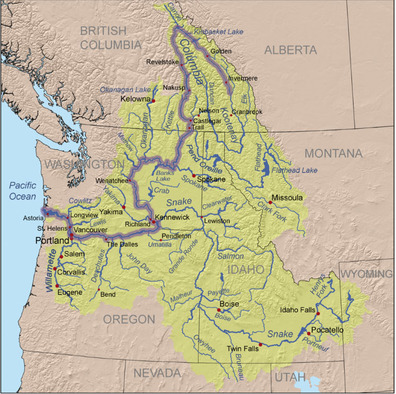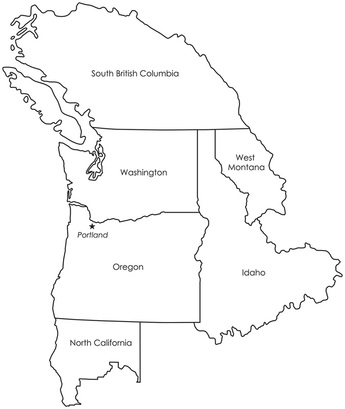About Cascadia
The idea of the Pacific Northwest becoming its own country isn't something I invented. It's been around since the 1975 when Ernest Callenbach wrote the book Ecotopia. The idea is based on bioregionalism, in which the borders of a country are defined by ecological, cultural, and political similarities. In the case of the Pacific Northwest, this means the Columbia River watershed, which includes parts of Oregon, Washington, Idaho, Montana, Wyoming, Nevada, and British Columbia. The boundaries of Cascadia have been drawn in many different ways, however, and have also included parts of Alaska and northern California, which share environmental and cultural similarities with the rest of this territory.
For The McCall Initiative, I chose to stick mostly with the Columbia River watershed and the northern part of California.
For The McCall Initiative, I chose to stick mostly with the Columbia River watershed and the northern part of California.
While this region tends to be seen as culturally and politically liberal, that's sort of a misnomer. The rural areas are quite conservative, it's just that they're outvoted by the more densely populated urban areas, which are strongly progressive. Naturally, this leads to some disgruntlement.
When I came up with the idea for The McCall Initiative after reading an article in the Portland Mercury about how climate change would effect the region, I had a dilemma. Much of the audience of my Full Throttle series is politically conservative. How could I write a series based on the liberal idea of global warming, a series that is very political in nature, without alienating half my readers? The solution to this problem, by happy accident, came from an element of the book concept itself. It was from my memories of Tom McCall, the Oregon governor who suggested that people should visit Oregon but not move here, that I got the idea for the closed Cascadian border. But McCall, a Republican, was also a man who strongly believed that politicians should do what was best for their constituents rather than simply voting along party lines. I have always tended to see the common ground between people, and I believe that the similarities we share as human beings are more important than our political, cultural, and religious differences. If there's one central theme to this series, it's that. Drawing on what I knew about Tom McCall, and on my own distress over the growing polarization of politics in this country, I resolved my dilemma by creating a president who tries to walk the middle ground, looking at what's logical, practical, and honorable rather than what will gain him votes from either side. I strove to make him likable enough that even if a reader disagrees with his politics, they'll still like him as a person. Whether or not I've succeeded in that is up to you.
To learn more about Cascadia, see the links below:
When I came up with the idea for The McCall Initiative after reading an article in the Portland Mercury about how climate change would effect the region, I had a dilemma. Much of the audience of my Full Throttle series is politically conservative. How could I write a series based on the liberal idea of global warming, a series that is very political in nature, without alienating half my readers? The solution to this problem, by happy accident, came from an element of the book concept itself. It was from my memories of Tom McCall, the Oregon governor who suggested that people should visit Oregon but not move here, that I got the idea for the closed Cascadian border. But McCall, a Republican, was also a man who strongly believed that politicians should do what was best for their constituents rather than simply voting along party lines. I have always tended to see the common ground between people, and I believe that the similarities we share as human beings are more important than our political, cultural, and religious differences. If there's one central theme to this series, it's that. Drawing on what I knew about Tom McCall, and on my own distress over the growing polarization of politics in this country, I resolved my dilemma by creating a president who tries to walk the middle ground, looking at what's logical, practical, and honorable rather than what will gain him votes from either side. I strove to make him likable enough that even if a reader disagrees with his politics, they'll still like him as a person. Whether or not I've succeeded in that is up to you.
To learn more about Cascadia, see the links below:


